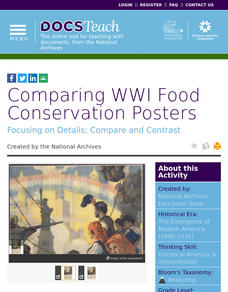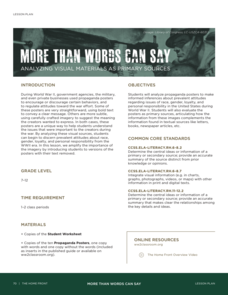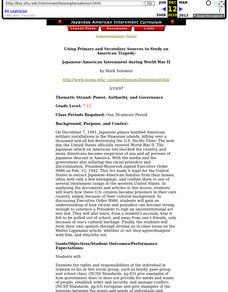US National Archives
WWII: The Pacific 1939-45 – Japan and the Atom Bomb
Though the scientists who developed the atom bomb did not believe it should be used to end World War II, American President Harry S. Truman and British Prime Minister Winston Churchill were of like mind in their decision to drop the bomb...
University of California
The Vietnam War (1945 – 1975)
Have you ever wanted to do something so perfectly you wound up not doing it well at all? Young historians use primary and secondary documents to analyze the United States involvement in the Vietnam War. The issues surrounding the...
PBS
The Supreme Court: Civil Rights and Civil Liberties
While World War II changed the international order, it also led to a fundamental shift in the concept of civil rights within the United States. Using a video and discussion questions, class members consider the effects the war had to the...
National Woman's History Museum
Real Life Rosie the Riveters
There was more than one Rosie the Riveter. To learn more about the contributions women made to the World War II war effort, groups become expert on different "Rosie" and share their findings in a Jigsaw activity. The lesson concludes...
DocsTeach
The Zimmermann Telegram
An enlightening activity explains how a telegram prompted the United States to enter World War I. Scholars examine the telegram and work to decode it. To finish, individuals complete a worksheet and participate in group discussion to...
American Battle Monuments Commission
The Battle of the Atlantic
World War II is known for its land and air battles in Europe, but the waters of the Atlantic saw its share of skirmishes from 1939 to 1945. Learn more about the roles of the Allied powers in establishing ocean territory during World War...
DocsTeach
Comparing WWI Food Conservation Posters
Food will win the war! At least, that is what some World War I-era posters say. Using two propaganda posters—one in English and one in Yiddish—young scholars consider why the Wilson administration had the posters created. Discussion...
American Battle Monuments Commission
The Meuse-Argonne Offensive
America's entrance into World War I drastically changed the scope of the conflict. An interactive map and timeline takes learners through the Meuse-Argonne Campaign, which lasted from September 26, 1918, to the eventual German armistice...
National WWII Museum
More Than Words Can Say: Analyzing Visual Materials as Primary Sources
The propaganda of World War II was a key factor in galvanizing the home front. Class members examine images—without their text—to consider their messages, including those around race and gender. Using pictures and discussion questions,...
National Woman's History Museum
Rosie the Riveter: The Embodiment of the American Woman’s Economic and Social Awakening
Critical events force change. World War II forced a change in perceptions of and attitudes toward women. When thousands of men joined the military American factories were left shorthanded. Young historians investigate how media was used...
Canadian War Museum
Analyzing Propaganda Posters
Understanding propaganda is very similar to understanding advertising's influence on an audience. Teach learners all about effective propaganda tactics by analyzing posters from World War I. Pupils work together to make their own posters...
National WWII Museum
Strategic Decision-Making in the Pacific
Pivotal moments happened in the Pacific Theater during World War II. Some of these turning points were the result of quick decision making, while others were the result of long-term strategies. Scholars evaluate the decisions using...
Smithsonian Institution
Korean War
North and South Korea: two regions divided. The story of the Korean War describes the events that occurred when these two regions' ideologies clashed. The resource uses various images and descriptions of artifacts, in addition to...
American Battlefield Trust
Civil War Personalities: Individual Examples of Character
What is a hero? What is character? Using biographies of figures during the Civil War, both famous and lesser known, scholars consider these questions. After brainstorming what they think makes a hero, they examine the lives of those who...
Curated OER
Dropping the Atomic Bomb: The Decision That Defined a Presidency
Students interpret historical evidence presented in primary and secondary resources. In this World War II lesson, students research the implications of the use of nuclear weapons to end the war in the Pacific. Students determine...
Curated OER
Japanese-American Internment during World War II
Students write an in-class essay on whether they agree/disagree with Lippmann's article concerning Japanese-American internment
Curated OER
Italian Enemy Aliens During World War II: Evacuation from Prohibited Zones
Students read and discuss the Enemy Alien Evacuation Order. They perform research by reading newspaper articles from February 1942 as well as investigating available information on the Internet. Students work in groups to create a...
Curated OER
World War II
Sixth graders read Under the Blood Red Sun (UBRS), V is for Victory (V), and Number the Stars(NS). They examine WWII through the eyes of Japanese, Danish, and American students and complete at least two projects: a radio broadcast and a...
Curated OER
World War II Webquest
Tenth graders work with a partner to locate and follow the directions of a webquest of their choice. Using the internet, they research their topic in depth and write a paper on their findings. They are assessed by the criteria on the...
Star Wars in the Classroom
Star Wars Geography Unit
What kind of animals live on an ice planet like Hoth? How would the habitat on Tatooine allow different organisms to thrive? Connect social studies, science, and Star Wars in one engaging activity that focuses on the ecosystems...
National Endowment for the Humanities
Soviet Espionage in America
The war against Communism and Joseph McCarthy’s place in it are the focus of a series of three lessons examining postwar America from 1945-1950. This first lesson asks groups to read an introduction that describes the Verona Project and...
Theodore Roosevelt Association
Defining America's Role in the World
As the first American president to win the Nobel Peace Prize, and only one of four presidents to do so in United States history, Theodore Roosevelt's foreign policy achievements and preservation of peace are often overshadowed by his...
Smithsonian Institution
The Price of Freedom: Americans at War
An interactive resource covers all of the United States' most prominent and influential historic wars including the Vietnam War, the Cold War, the War of 1812, and the Korean War. Learners observe cause and effect as well as how violence...
Curated OER
Events and Effects of World War I
Ninth graders explore the main events, key people, outcomes and lasting effects of World War I. They research the lasting effects of World War I on the 20th Century and discuss the Treaty of Versailles and its effects on Germany.
Other popular searches
- World War Ii
- World War I
- World War I and Ii
- World War 1
- World War 2
- Causes of World War I
- Causes World War Ii
- World War One
- World War Ii Map
- World War Ii Holocaust
- World War Two
- World War Ii Battles























